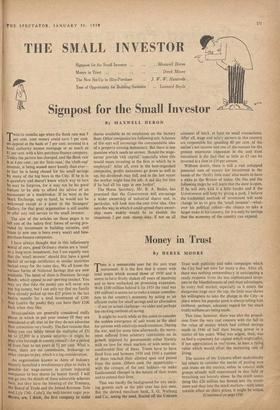THE SMALL INVESTOR
Signpost for the Small Investor Money in Trust .. • • • • The New Set-Up in Hire-Purchase Year of Opportunity for Building Societies
..Maxwell Heron .. Derek Moore J. W. W. Huntrods .. Leonard Boyle
Signpost for the Small Investor
By MAXWELL HERON TWELVE months ago when the Bank rate was 7 per cent. your money could earn 5 per cent. on deposit at the bank or 7 per cent. invested in a local authority trustee mortgage or as much as 8/ per cent. with a hire-purchase finance company. Today the picture has changed, and the Bank rate is at 4 per cent.; yet the 'little man,' the 'cloth-cap' investor, is being wooed more keenly than ever— in fact he is being chased for his small savings by many of the big boys in the City. If he is in a quandary and doesn't know which way to turn he may be forgiven, for it may not be his good fortune to be able to afford the advice of an accountant or a stockbroker. If he went to the Stock Exchange, cap in hand, he would not be Welcomed except as a guest in the Strangers' Gallery, for that great organisation is still unable to offer any real service to the small investor.
The aim of the articles on these pages is to tell you of the 'safety first' forms of saving pro- vided by investment in building societies, unit trusts (a new one is born every week) and hire- purchase finance companies.
I have always thought that in this inflationary world of ours, good Ordinary shares are a 'must' as a long-term investment, but I am equally sure that the 'small investor' should first have a good Packet of savings certificates or similar securities tucked away for the rainy day. We all know the various forms of National Savings that are now available. The latest of them is Premium Savings Bonds, which appeal to our sporting instinct. You may say that (like the pools) you will never win any big money, but I can only say that my family have already picked up two £25 prizes in the last twelve months for a total investment of £100. And (unlike the pools) they can have their £100 back when they like.
Municipalities are generally considered stuffy places in which to put your money (if they are considered at all, that is) for they do not advertise their attractions very loudly. The fact remains that today you can safely invest (in multiples of £5) tIP to 0,000 in a trustee security —it might be Your own borough or county council—for a period of from four to ten years at 5-k per cent. What is more, there are no commission, brokerage or other charges to pay, which is a big consideration.
An organisation known as Aims of Industry recently launched a revolutionary plan to make it Possible for wage-earners in certain industrial companies to buy shares (in bearer forml. I will not go into the details of these admirable schenies here, but they have the blessing of the Treasury, the Board of Trade and the Inland Revenue. Tate and Lyle ('Mr. Cube'), the well-known sugar pro- ducers, are, I think, the first company to make
shares available to its employees on the factory floor. Other companies are following suit. Schemes of this sort will encourage the commendable idea of a property-owning democracy. But there is one question which needs an answer. Should the wage- earner provide 'risk capital,' especially when this would mean investing in the firm in which he is employed? After all, even in the best-organised companies, profits sometimes go down as well as up, the dividends may fall, and in the last resort the worker might lose his job. A sad day for him if he had all his eggs in one basket!
The Home Secretary, Mr. R. A. Butler, has promised that the Government will encourage a wider ownership of industrial shares and, in particular, will look into the unit trust idea. One sure-fire way in which it could spread share owner- ship more widely would be to abolish the iniquitous 2 per cent. stamp duty, if not on all amounts of stock, at least on small transactions. After all, wage and salary earners in this country are responsible for spending 80 per cent. of the nation's net income and one of the reasons for the present enormous expansion in the unit trust movement is the fact that as little as £5 can be invested at a time or i10 per annum.
Without doubt, there is still a vast untapped potential sum of money for investment in the hands of the 'thrifty little man' who wants to have a stake in the Britain of today. On this and the following pages he will learn that the door is open. If he will only kick it a little harder and if the Government will help by giving a push, I believe the traditional methods of investment will soon change so as to give the 'small investor'—what- ever his political colour—the chance to take a larger stake in his country, for it is only by savings that the economy of the country can expand.










































 Previous page
Previous page